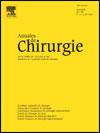Reconstruction après pharyngolaryngectomie totale circulaire : comparaison de la plastie gastrique et du greffon de jejunum libre - 01/01/02
Riassunto |
But de l'étude : Etudier la mortalité, la morbidité hospitalières et la survie des patients opérés d'un cancer de l'hypopharynx ou de l'oesophage cervical et déterminer la meilleure technique de reconstruction après pharyngolaryngectomie totale.
Patients et méthodes : Nous avons revu les dossiers de 209 patients ayant bénéficié d'une pharyngolaryngectomie totale circulaire entre mai 1982 et janvier 2000. La plupart de ces patients avaient un cancer avancé, hypopharyngé dans 131 cas et cervical dans 78 cas. Aucun patient n'a été perdu de vue. Les tests du
 2 et du log rank ont été utilisés au seuil de 5 %.
2 et du log rank ont été utilisés au seuil de 5 %.
Résultats : Les taux de mortalité et de morbidité postopératoires étaient respectivement de 4,8 % et de 38,3 %. Le rétablissement de la continuité digestive a été réalisé par une plastie gastrique (127 patients), colique (5 patients) ou par un greffon jéjunal libre (77 patients). Les survies à 1 an et 5 ans étaient respectivement de 62 % et 24 %. Il n'existait pas de différence significative en terme de survie entre l'utilisation de plasties gastriques et de greffons de jéjunum libre, mais les complications postopératoires étaient moindres dans le groupe plastie gastrique (33 % vs 47 %, p < 0,05), ainsi que les taux de récidives locales (15,8 % vs 33,8 %, p = 0,004) et de survie sans dysphagie (76 % vs 89 %, p < 10-5).
Conclusion : La résection chirurgicale a sa place dans le traitement des cancers avancés de l'hypopharynx et de l'oesophage cervical, avec de meilleurs résultats avec reconstruction par plastie gastrique.
Mots clés : Chirurgie ; Cancer ; Hypopharynx ; Oesophage cervical.
Abstract |
Aim of the study: To elucidate hospital mortality, morbidity and actuarial survival rates of patients with carcinoma of the hypopharynx and cervical oesophagus and to identify the technique of choice for reconstruction after pharyngolaryngectomy.
Patients and methods: We reviewed the records of 209 patients who underwent total pharyngolaryngectomy between May 1982 and January 2000. The majority of patients had advanced cancer: hypopharyngeal in 131 cases and cervical oesophageal in 78 cases. Follow-up was complete for all patients. Chi 2 and log rank tests were used, with a limit of significance of 5%.
Results: The postoperative mortality and morbidity rates were 4.8% and 38.3%, respectively. Alimentary continuity was achieved using the stomach (127 patients), colon (5 patients), or free jejunal autograft (77 patients). The 1-year and 5-year survival rates were 62% and 24%, respectively. There was no significant difference with regard to the survival between gastric transposition and free jejunal autograft, but there were fewer complications in the gastric pull-up group with regard to the respiratory complications (33% vs 47.0%, p < 0.05), local recurrences (15.8% vs 33.8%, p = 0.004) and survival without dysphagia (76% vs 89%, p < 10-5).
Conclusion: Surgical ablation is a viable option for advanced hypopharyngeal and cervical oesophageal neoplasms, and stomach interposition is the preferred method of reconstruction.
Mots clés : Surgery ; Cancer ; Hypopharynx ; Cervical oesophagus.
Mappa
Vol 127 - N° 6
P. 431-438 - Giugno 2002 Ritorno al numeroBenvenuto su EM|consulte, il riferimento dei professionisti della salute.


